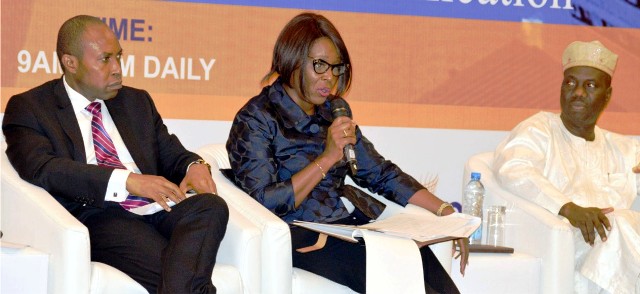Business
Sustain Policies That Catalysed Exit, OPS Tells FG

The Organised Private Sector (OPS) last Wednesday urged the Federal Government to sustain the various policies that catalysed the country’s exit from recession.
In separate interviews with newsmen, stakeholders in the OPS also urged government to focus on economic diversification to prevent a relapse of the recession.
Muda Yusuf, Director-General, Lagos Chamber of Commerce and Industry (LCCI), expressed concern on the country’s 0.55 per cent growth rate which was largely driven by improvement in oil prices and output.
The LCCI director-general said that this was fragile and volatile, stressing the need to reduce the country’s exposure to shocks from global crude oil prices.
Our correspondent recalls that data from the National Bureau of Statistics (NBS) reveals that the country’s recovery from recession was largely driven by the performance of the oil, agriculture, manufacturing and trade sectors.
Nigeria’s economy emerged from recession in the second quarter, expanding 0.55 percent year-on-year, the NBS said last Tuesday, as economists expressed concern at the sluggish recovery.
It shrank by 1.5 per cent in 2016 for its first annual contraction in 25 years. It also declined in the first quarter of this year, due to lower revenues from oil — its dominant export — and a shortage of hard currency.
”If we do not intensify efforts on economic diversification, we can easily slip back into recession.
“To diversify the economy, we need to put in place policies that would continue to ensure the stability of the macroeconomic environment and address ease of doing business.
“Already, a lot is happening concerning easing the business environment but a lot more could still be done.
“We need to drive down cost of operation for businesses; diversification within the oil and gas sector should be our target because we should be doing more of refining, petrochemicals, fertiliser and more of gas-based industries.
“We need to address infrastructure issues because we need infrastructure to diversify and you cannot have sustainable industrialisation and agricultural sector development without infrastructure,” Yusuf said.
The LCCI boss urged the government to urgently address the issue of multiplicity of foreign exchange rates, saying that it was affecting
Transport
Automated Points Concession : FAAN Workers Gave 72hrs To Revise Decisions In PH

Transport
FAAN Announces Pick-Up Points for Go-Cashless Cards

Business
Fidelity Bank To Empower Women With Sustainable Entrepreneurship Skills, HAP2.0
-
Politics4 days ago
2027: NIGERIANS FAULT INEC ON DIGITAL MEMBERSHIP REGISTER DIRECTIVE
-

 Environment4 days ago
Environment4 days agoLAWMA Director Says Sweeping Reforms Have Improved Waste Collection
-
Politics4 days ago
LP Crisis: Ex-NWC Member Dumps Dumps Abure Faction
-

 Politics4 days ago
Politics4 days agoUmahi Dismisses Allegations On Social Media, Insists On Projects Delivery
-

 Sports4 days ago
Sports4 days agoAbia Not Sure To Secure continental Ticket
-
Politics4 days ago
NATASHA ELECTRIC VEHICLES INITIATIVE IN KOGI CENTRAL
-
Sports4 days ago
La Liga: Yamal Records First Career Hat-trick
-

 Sports4 days ago
Sports4 days agoPSG Extend Lead In Ligue 1

